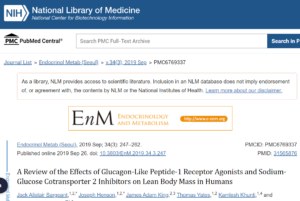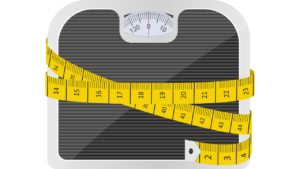Does Ozempic, Wegovy, and Mounjaro cause Muscle loss? This is the latest question that has been flooding my inbox. People are concerned. Rightfully so! When we say, ‘I want to lose weight,’ what we really mean is we want to lose fat. So if we are losing muscle instead, well, what is the point?!
To the point – Yes, these medications can lead to a loss of muscle. However, it isn’t the medications themselves that are chewing up your muscle. Anytime, anyone, anywhere, goes on a diet and loses weight, they will lose muscle. Even mass monsters like Chris Bumstead eat a ton of protein, train like crazy, and take various illicit substances to support their muscles. Ultimately they lose some muscle when they prepare for a bodybuilding competition. This is a fact.

So, why does this happen?!
Biology.
Your body, at its present weight, requires a certain amount of food each day to keep you alive and to maintain your weight. When you go on a diet and provide your body with less food than it needs, well, it is going to look elsewhere to make up for the lack of food or calories. Thus your body goes to your fat stores and your muscles. The reason it goes to your muscles is that fat does not have nor can it be converted into the necessary nutrients your body needs to function. So what it can’t obtain from fat, it obtains from breaking down your muscles.
‘But how am I supposed to look jacked at my Aunt Mary’s third wedding this summer?’
I am sorry, but your body does not care about you looking jacked. The only thing it cares about is survival and doing everything it can to keep you alive for the next five minutes.
 In saying all of that, your body is no fool, and it recognizes that muscle serves an important function. In particular, it allows you to move and go find food. Or 30,000 years ago, it allowed you to run and scream while chasing a woolly mammoth, and if your MacGyvered stick ‘n’ rock combo held together, you got to be the village hero for bringing home dinner. Therefore, your body does its best to preserve muscle and utilize your fat stores as much as possible. On average, for every 1 lb of weight, an individual loses only 20-30% of that pound should be muscle. The other 70-80% should be fat.
In saying all of that, your body is no fool, and it recognizes that muscle serves an important function. In particular, it allows you to move and go find food. Or 30,000 years ago, it allowed you to run and scream while chasing a woolly mammoth, and if your MacGyvered stick ‘n’ rock combo held together, you got to be the village hero for bringing home dinner. Therefore, your body does its best to preserve muscle and utilize your fat stores as much as possible. On average, for every 1 lb of weight, an individual loses only 20-30% of that pound should be muscle. The other 70-80% should be fat.
Unveiling Concerns Surrounding Weight Loss Meds
So, why is everyone losing their collective poop about muscle loss with Wegovy and the other weight loss meds?!
 Other than a few social media influencers with opinions and a product to sell trying to warn the people. There has been some conflicting data with regard to the use of GLP-1 medications such as Wegovy for weight loss and how much of that weight is coming from muscle vs. fat. With GLP-1 medications potentially lead to muscle mass losses of 20-50%. So by taking these medications, people could lose up to 20% more muscle than if they had just done a standard calorie deficit?
Other than a few social media influencers with opinions and a product to sell trying to warn the people. There has been some conflicting data with regard to the use of GLP-1 medications such as Wegovy for weight loss and how much of that weight is coming from muscle vs. fat. With GLP-1 medications potentially lead to muscle mass losses of 20-50%. So by taking these medications, people could lose up to 20% more muscle than if they had just done a standard calorie deficit?

Maybe.
Let’s look at the STEP 1 Trial – which was the initial landmark trial showing the benefit of Wegovy in Obesity (⅓ of participants lost ~15% of their baseline weight) a small subset of the participants were included in the substudy below to look at changes in body composition when participants were on Wegovy.

Wilding and friends looked at about 140 individuals, some were on placebo and the others on Wegovy. Before starting the trial and at the end of the trial, these individuals had a DEXA scan. DEXA, or dual-energy X-ray absorptiometry, is the gold standard for measuring body composition or the amount of fat mass and fat-free mass on an individual’s body.
Unraveling Contradictory Findings and Lost Data
And they found some curious results…
 Participants that were given Wegovy, of the weight they lost, ~40% of it was fat-free mass. So that is 10% more fat-free mass than seen on average! Based on that, things are not looking so good.
Participants that were given Wegovy, of the weight they lost, ~40% of it was fat-free mass. So that is 10% more fat-free mass than seen on average! Based on that, things are not looking so good.
With this trial, there might have been an error. When we look at the individuals that were given the placebo, of the weight they lost ~55% of it was fat-free mass. The individuals that were not given Wegovy – lost even more, ~15% more fat-free mass than the Wegovy group.
That result did not quite add for me as the placebo group should be in line with the 20-30% we discussed earlier. Not over 50% lost as fat-free mass. So this makes me question the overall results seen in this trial, including the results of the individuals given Wegovy. Of the weight they lost, was 40% of it actually fat-free mass? Unfortunately, we may never know.
There have been other studies that have mentioned a 40% loss in fat-free mass and other studies that have shown a gain in fat-free mass. So as you can see, it is all conflicting and not clear as to what the truth is. Therefore, further research is required.
The Importance of Context and Individual Factors
Regardless, the question that needs to be answered is, do we actually care about the amount of muscle being lost?
I would argue yes and no. However, context is always needed.

First off, muscles are good. The more muscle
you have, the healthier you will be. Especially the older you get. Muscle helps with everything from movement to immune function to preventing falls.
Now when we look at some of these trials, overall, the ratio of fat to muscle mass that is lost is favorable. Even if every pound that is lost, 50% of it is muscle, that is OK. The reason is that many individuals who have Obesity have a high amount of muscle mass. Therefore, at a lower weight, the amount of muscle they have is proportional to that new weight. They simply lost extra muscle weight. There are other confounders in this data that still need to be explored, but overall the loss of muscle is not as scary as some IG influencers make it out to be.
So we do not need to worry at all?
 Not quite. One of your goals along your journey should be to try and maintain as much muscle as possible. Not only for health benefits but it will also help you maintain your weight down the road.
Not quite. One of your goals along your journey should be to try and maintain as much muscle as possible. Not only for health benefits but it will also help you maintain your weight down the road.
What we know is that the faster you lose weight on these medications, you are likely going to lose a greater amount of muscle mass. Another reason to stop focusing on the scale – lose fat vs. muscle. So take your time – focus on a moderate calorie deficit. Make sure you eat plenty of protein, start lifting weights or doing some sort of resistance training, and SLEEP. All of these things will help you to maintain that precious muscle and further improve your overall health and well-being, which is the point of all this, to begin with!
Until next time my friends, always remember that small tweaks lead to massive peaks!
Until next time.
 Dr. Dan
Dr. Dan
Follow me on social media for regular updates – @TheOfficialDrDan
Subscribe to my newsletter for a heads-up on all new content.
Sharing is caring! Here’s the link for social, email, and even text – https://healthevolved.co/muscle-loss
If you need some coaching support on your weight management journey, you can book a consultation with me to see if you’d be a good fit for our program.
Questions or comments? Please send them my way on our Contact Us page!
References:
National Library of Medicine (September 26, 20219). A Review of the Effects of Glucagon-Like Peptide-1 Receptor Agonists and Sodium-Glucose Cotransporter 2 Inhibitors on Lean Body Mass in Humans. Retrieved from: https://www.ncbi.nlm.nih.gov/pmc/articles/PMC6769337
National Library of Medicine (May 3, 2021). Impact of Semaglutide on Body Composition in Adults With Overweight or Obesity: Exploratory Analysis of the STEP 1 Study Retrieved from: https://www.ncbi.nlm.nih.gov/pmc/articles/PMC8089287


 Dr. Dan
Dr. Dan



